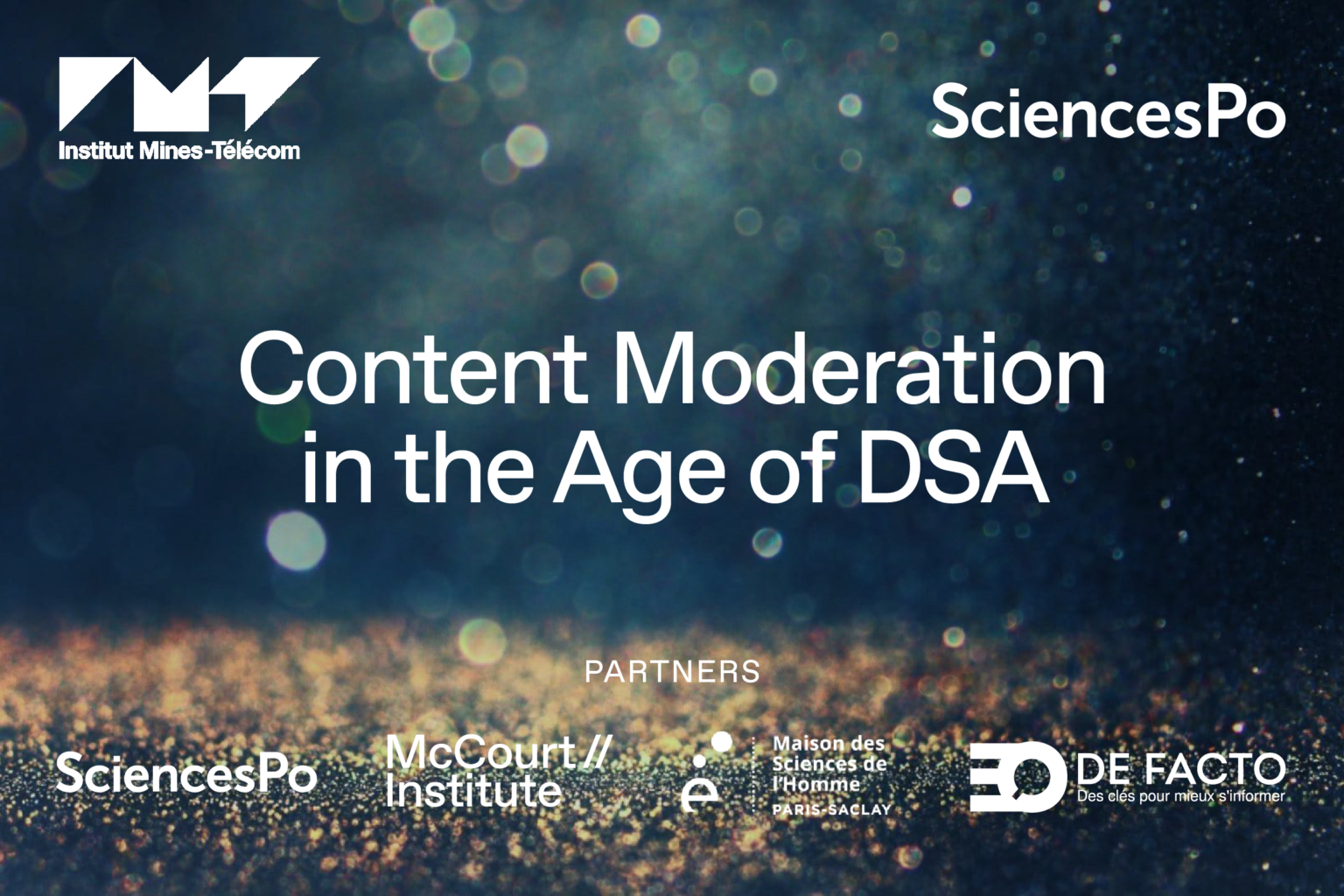Content Moderation in the Age of DSA
Sorry...
This event has ended
This conference aims to put into perspective the new environment the DSA is about to set up in the European context by bringing together researchers, regulatory actors and representatives of digital platforms.

The new European Digital Services Act provides an ambitious regulatory framework to face the digital transformation of the public space. The Act defines new obligations for digital platforms and aims to make the moderation policies of large online platforms more transparent and accountable. Is this new regulatory framework appropriate to solve the digital information disorder? The circulation of fake news, hate speech and the algorithmic amplification of unreliable content have deeply damaged the quality of public discussion.
Program
January 12th
This first day will question the drifts that currently affect online communication and the new rules, techniques and practices underlying moderation.
8:30 – Welcome
9:00 – 9:30 – Introduction
Christine Balagué, Professor of Management at Institut Mines Telecom Business School, Founder of the Good in Tech research network.
9:30 – 10:45 – Session 1: Freedom of speech and internet
Charles Girard, Associate professor of Philosophy at Jean Moulin Lyon 3 University : Freedom of Speech in the Digital Public Sphere
Joris Van Hoboken, Associate Professor of Law at University of Amsterdam and Professor of law at the Vrije Universiteit Brussels : From protecting freedom of expression to a balanced approach in protecting fundamental rights in online content moderation.
Kate Klonick, Associate Professor of Law at St. John’s University Law School and Affiliate Fellow at the Information Society Project at Yale Law School : Big Speech
Moderator : Constance Bommelaer de Leusse, McCourt Institute
10:45 – 11:15 – Break
11:15 – 12:30 – Session 2: Information disorders: disinformation, hate speech
Manon Berriche, PhD Student at SciencesPo Médialab : Faker Island. Who are the rare users who share fake news on the French Twittersphere?
Kevin Limonier, Associate Professor of Geopolitics at Université Paris 8 : Russian disinformation ecosystems since the beginning of the invasion of Ukraine
Célia Zolynski, Professor of Law, University Paris 1 Sorbonne : Fighting online hate: what role for the user?
Moderator : Inna Lyubareva, Assistant Professor in economy at Institut Mines Telecom Atlantique
12:30 – 14:00 – Lunch
14:00 – 15:30 – Session 3: Fact checking and moderation
Julia Cagé, Assistant Professor of Economics, Sciences Po Paris and Emeric Henry, Professor of Economics, Sciences Po Paris : Fact-Checking and Misinformation: Evidence from the Market Leader
Valentine Crosset, Lecturer at Université de Genève and Associate Researcher at SciencesPo Médialab : Mapping Online Offenses from Twitter : Exploring User Reporting Practices and Twitter Moderation
Romain Badouard, Assistant professor in information and communication sciences, Panthéon-Assas University : How platforms deal with fake news and « poor-quality » contents
Paolo Papotti, IMT, EURECOM, Campus SophiaTech : Auditing Crowdsourced Fact-Checking at Twitter
Moderator : Sylvain Parasie, Professor of sociology at Sciences Po
15:30 – 16:00 – Break
16:00 – 17:15 – Session 4: Algorithms and content moderation
Patrick Maillé, Professor of computer science at IMT Atlantique : Investigating bias in search engines’ results: why and how?
Grazia Cecere, Professor of economics at Institut Mines-Télécom Business School, scientific expert at Arcom : Trade-offs in Automating Platform Regulatory Compliance By Algorithm: Evidence from the COVID-19 Pandemic
Robert Gorwa: Postdoctoral Research Fellow at the WZB Berlin Social Science Center : Automated Content Moderation and its Emerging Socio-Technical Challenges
Moderator: Christine Balagué, Professor of Management, Institut Mines-Télécom, Business School, Founder of Good in Tech Network
17:15 – 17:45 – Conclusion
Mathias Vicheras, Sciences Po director
January 13th
The second day will focus on the issues of platform regulation and the new European DSA, with different actors.
8:30 – Welcome
9:00 – 10:15 – Session 5: A European-American view of platform regulation
Florence G’sell, Professor of Law at Université de Lorraine and Head of the Digital Governance and Sovereignty Chair.
Rachel Griffin, PhD Student, Sciences Po Law School, Sciences Po Paris
Daphné Keller, Director of Program on Platform Regulation at Stanford’s Cyber Policy Center and Lecturer of law at Stanford
Moderator: Dominique Boullier, Centre For European Studies and Comparative Politics, Sciences Po Paris
10:15 – 10:30 – Break
10:30 – 12:00 – Round Table 1: DSA and platforms regulation / European dynamics of DSA
Prabhat Agarwal, Head Of Unit at European Commission
Celene Craig, Chief Executive of Broadcasting Authority of Ireland
Jan Gerlach, Public Policy Director at the Wikimedia Foundation
Benoît Loutrel, Member of the Arcom College
Clément Wolf, Head of Information Quality Policy, Google
Moderator : Séverine Dussolier, professor of law Sciences Po Law School, Sciences Po Paris
12:00 – 13:30 – Lunch
13:30 – 14:00 – Keynote
Rebekah Tromble, Director of the Institute for Data, Democracy & Politics and Associate Professor in the School of Media & Public Affairs at George Washington University in Washington, DC
14:00 – 15:30 – Round Table 2: Research, civil society and the audit of platforms
Serge Abiteboul, Member of the executive board of ARCEP, researcher at INRIA, PARIS, Valda team, DI, ENS, CNRS, PSL University
Chris Gray, author and activist, writer of the book “The Moderator”
Jan Penfrat, Senior Policy Advisor, European Digital Rights Initiative
Nate Persily, James B. McClatchy Professor of law at Stanford Law School, Co-Director, Stanford Cyber Policy CenterProfessor of Law at Stanford Law School
Shaden Shabayek, post-doctoral researcher at Université Paris-Saclay and associate researcher at SciencesPo Médialab
Moderator : Inna Lyubareva, Assistant Professor in economy at Institut Mines Telecom Atlantique
15:30 – 17:30 – Break
16:00 – 17:30 – Round Table 3: DSA and platforms regulation/ national dynamics of DSA
Marie-Laure Denis, Président de la CNIL
Sergeï Guriev, Sciences Po Provost, Professor of Economics at Sciences Po Paris
Roch-Olivier Maistre, Président de l’ARCOM
Leïla Mörch, Program Manager Europe McCourt Institute
Anne-Sophie Taillandier, Institut Mines-Télécom, Data & AI TeraLab Platform Director
Moderator : Christine Balagué, Professor of Management, Institut Mines-Télécom, Business School, Founder of Good in Tech Network